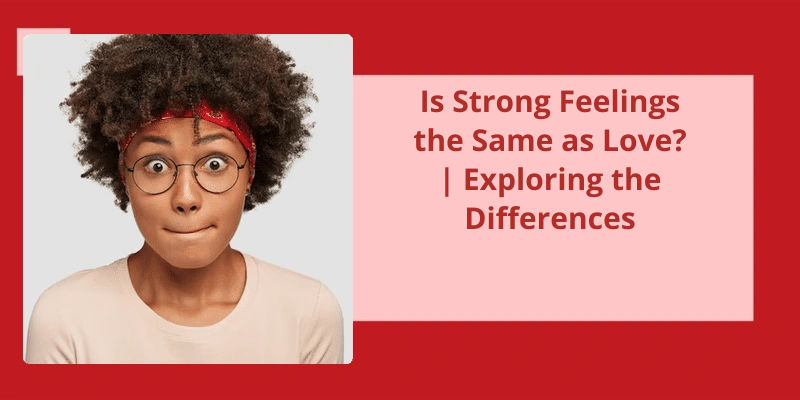Feelings are incredibly complex and can manifest in a variety of ways, but when it comes to love, confusion can often arise. It's not always easy to discern whether the intense emotions we're experiencing are simply strong feelings or something deeper and more long-lasting. Love is a complex and multifaceted emotion that requires a unique combination of intense feelings, passion, and a strong sense of connection with another person. Many people struggle with the idea of whether strong feelings and love are the same thing or not. While it's true that they share some similarities, it's important to understand that they aren’t the same. Understanding the nuances between these different types of emotions is key to building healthy, fulfilling relationships.
What Is the Difference Between Strong Feelings and Love?
Infatuation, on the other hand, is a temporary feeling that’s often obsessive and self-centered. It’s an intense attraction to someone based on physical appearance or other superficial qualities. It can be exciting and exhilarating, but it lacks the deeper emotional bond that love creates. Infatuation can also be fleeting, as it often fades once the initial rush of attraction wears off.
Another difference between strong feelings and love is that love is built on a foundation of trust and mutual respect. It involves an emotional investment in another person, and a willingness to work through challenges and difficulties together. Strong feelings such as infatuation may be based on lust or other shallow desires, and may not have the same level of commitment or willingness to work through problems.
Love is also characterized by a sense of security and comfort. It creates a feeling of safety and stability, and allows for vulnerability and emotional openness. Strong feelings may be overwhelming or intense, but they may not provide the same level of emotional safety and support that love does.
In addition, love is often associated with qualities such as compassion, forgiveness, and selflessness. It involves putting the needs and desires of another person before your own, and working to support their goals and aspirations. Strong feelings may be more focused on the self, and may not involve the same level of compassion or concern for others.
While strong feelings such as infatuation may be intense and exciting, love involves a deeper emotional connection that goes beyond the surface level.
How to Tell if You Are Experiencing Strong Feelings or Love: Signs to Look Out For.
- Thinking about them constantly
- Feeling nervous or excited before seeing them
- Wanting to spend all your time with them
- Prioritizing their needs and wants over your own
- Feeling happier when they’re around
- Being able to be vulnerable and open with them
- Feeling a deep sense of connection and understanding
- Feeling intense emotions, both positive and negative
- Feeling a strong desire to make them happy
- Feeling a sense of loss or emptiness when they aren’t around
Love is a complex emotion that often defies simple definition. Many believe that love must always be accompanied by a strong feeling, but this isn’t necessarily true. In fact, love is often a matter of choice, and it can endure even when feelings change over time. In the following section, we will explore this idea more deeply and look at some examples of how love can exist without it’s traditional emotional intensity.
Does Love Always Have to Be a Feeling?
Love is a decision that’s made, and it’s a commitment to choose the well-being of your partner over your own self-interest. It’s about caring for them and supporting them every single day, even when it might be difficult to do so. This kind of love is often seen in long-term relationships and marriages, where individuals choose to love their partner even though they may not always have the same feelings they’d at the beginning of their relationship.
Another aspect of love is that it isn’t always easy. Relationships take effort and require work. Love isn’t just a feeling that comes and goes, but it’s also a choice to stick by your partner through thick and thin. Feelings may fade, but true love is the foundation that keeps partners together for life. It involves compromise and sacrifice, but it ultimately brings the two individuals closer together.
Love is the foundation that keeps relationships together through thick and thin, and it requires effort and work to maintain. So, while love may not always be a feeling for some, it’s a choice that can bring happiness and fulfillment in life.
The Difference Between Love and Infatuation
- Love involves a deep emotional connection that grows over time.
- Infatuation is based on more superficial qualities such as physical appearance or charm.
- Love is often accompanied by feelings of empathy, commitment, and a desire for long-term stability.
- Infatuation is focused on immediate gratification and may dissolve when the initial excitement wears off.
- Love is often expressed through actions and meaningful gestures, such as taking care of each other or sacrificing personal needs for the benefit of the relationship.
- Infatuation may be more focused on romantic fantasies and a desire for constant attention and validation.
- While infatuation can be intense and exciting, love deepens over time and can provide a more substantial foundation for a lasting, fulfilling relationship.
Source: Is Love A Choice Or A Feeling? – BetterHelp
However, for others, having strong feelings for someone means much more than just physical attraction. It can represent a deep emotional connection, a sense of safety and comfort, or even a desire for a long-term commitment. In this article, we’ll explore what it means to have strong feelings for someone and how to navigate the complexities that come with these feelings.
What Does It Mean When Someone Says They Have Strong Feelings for Someone?
However, when someone says they’ve strong feelings for someone, it usually goes beyond that. It can be an expression of love, a deep emotional connection, a feeling of companionship or a sense of comfort and safety in that persons presence. It can also mean that the person is willing to commit to the other in a serious, long-term relationship, and is willing to put in the effort to make it work.
It can feel exhilarating, like a rush of adrenaline, akin to being swept off ones feet. On the flip side, it can also be nerve-wracking and scary. The fear of rejection, disappointment, or heartbreak can be overwhelming, making it difficult to express ones feelings authentically.
It can be devastating to realize that the person you love doesn’t feel the same way about you. This can lead to intense feelings of sadness, loneliness, and rejection, and can make it challenging to move on.
In some cases, having strong feelings for someone might be mistaken for obsession or infatuation. People often mistake infatuation for love and can become fixated on someone to the point of being unable to function healthily without them. This can be harmful, especially if it’s one-sided or unhealthy.
It manifests as a sense of respect, care, and admiration for the person, and can be a harbinger of a deep, fulfilling, and lasting relationship.
How Do You Differentiate Between Infatuation and Genuine Love?
Infatuation is a strong feeling of attraction towards someone you hardly know, usually based on physical appearance or initial chemistry. On the other hand, genuine love involves a deeper emotional connection, based on mutual respect, trust, and admiration for each other’s qualities and flaws. Genuine love takes time to develop and goes beyond just physical attraction.
As we delve deeper into the concept of love and fear, it’s important to understand how these emotions impact our lives. While fear can create temporary motivation for action, it ultimately holds us back from achieving our full potential. On the other hand, love drives us towards self-improvement and healthy relationships, creating a more fulfilling life. In this article, we will explore the power of love and how to cultivate it in our everyday lives.
What’s More Powerful Love or Fear?
Love has the ability to transform people and situations in a way that fear can never do. When we let go of fear and embody love, we open ourselves up to a higher level of consciousness, one that enables us to live fulfilling and meaningful lives.
Love also builds trust, which is the foundation of all healthy relationships. When we act from a place of love, we build trust with ourselves and with others. Fear, on the other hand, erodes trust and causes us to become defensive and guarded. When we operate from a place of fear, we close ourselves off to the world and miss out on the joy that comes from connecting with others.
Moreover, love is contagious. When we express love, it’s a ripple effect that spreads throughout the world, creating a positive energy that touches all those who come into contact with it. Fear, on the other hand, is isolating and causes us to withdraw from others. When we let go of fear and embody love, we become a beacon of light that attracts others to us.
The Role of Self-Love in Cultivating Love for Others
Self-love is an important aspect of cultivating love for others. By caring for ourselves and valuing our own worth, we’re better able to connect with and appreciate the worth of others. This creates a positive cycle of love and compassion, where the more we love ourselves, the more we’re able to extend that love to others. Ultimately, practicing self-love is a key component in building healthy, fulfilling relationships with others.
When it comes to describing the feeling of being in love, there are countless words that can be used to capture the depth of emotion. From passion to infatuation and everything in between, there are a plethora of synonyms and related words that can be employed to convey the intensity of this complex and beautiful experience. In this article, we will explore some of the many ways in which people have described being deeply in love, and consider the nuances that make each of these words unique.
What Is Another Word for Deeply in Love?
Love is a powerful emotion that can be felt in countless ways. There are many different synonyms for deeply in love that attempt to capture the essence of this emotion. Some people describe being in love as feeling absorbed or enamored with another person, while others might use words like enchanted or enthralled to convey their feelings. Ultimately, the choice of words will depend on the individual and their own personal experience of being in love.
It can inspire us to be more compassionate, patient, and understanding, and it can help us to become better versions of ourselves. Whether we’re experiencing this emotion for the first time or have been in love for years, it’s a powerful force that can bring us great happiness and fulfillment.
However, being in love can also be challenging. It requires vulnerability, self-awareness, and a willingness to work through difficult emotions and situations. It can also bring up feelings of fear, insecurity, and uncertainty, especially if we’ve been hurt in the past. But despite these challenges, being in love is a rewarding and worthwhile experience that can teach us valuable lessons about ourselves and our capacity for love and connection.
Whether we describe being in love as being absorbed, aroused, delighted, enamored, enchanted, or enthralled, the important thing is that we honor and celebrate this powerful force that brings us closer to ourselves and to one another.
Different Cultural Expressions of Love and Their Unique Vocabulary
This topic explores how various cultures express their love, and the distinct vocabulary associated with these expressions. It highlights the differences in the ways love is communicated and the various terms used to convey these sentiments across different cultures.
Conclusion
It’s important to recognize the difference between strong feelings and romantic love, as confusing the two can lead to unrequited love and heartbreak. While strong feelings can be intense and meaningful, they don’t necessarily signify a lifelong commitment or desire for a romantic relationship. It’s essential to be honest with oneself and with others about the nature of one's feelings to avoid misunderstandings and emotional turmoil. Ultimately, strong feelings can bring joy and fulfillment, but only when they’re understood and accepted for what they truly are.






